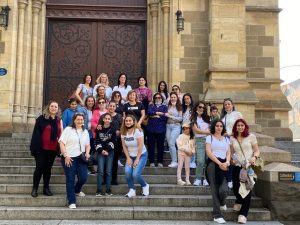Syrian community celebrates the end of Assad
Australia’s Syrian refugee community is celebrating the fall of the brutal Assad regime in their homeland but they also have concerns about what the future holds for Syria.
The regime of dictator Bashar al Assad was toppled this week by a coalition of militias led by Mohammed al-Golani and his Hayat Tahrir al-Sham (HTS) group.
Melbourne based Syrian community leader Norma Medawar said most Syrians in Australia are celebrating the end of the Assad era.
“Most people are feeling happy about the end of Assad, but there is a lot of uncertainty about the future,” Ms Medawar said.
“The new regime is saying that it will bring peace and secularism, but we can’t be sure that will happen.
“There is a risk that minority groups will be discriminated against, especially if Sharia law is introduced. We have seen this happen before in countries like Afghanistan and Libya.”
Ms Medawar said that the rebel group had been going from town to town assuring people they would be safe.
“They have imposed curfews ostensibly to keep people safe and they seem to have people’s safety at heart,” she said.
“And the intelligence they have is incredible. We are hearing that they know who the local leaders are and where to find them. It seems extremely well planned and organised.
“They have spoken to church and other leaders assuring them they would be OK. Generally, people are happy and we hope that happiness lasts.
“Any change is good after 54 years of what I call a ‘dark era’. We are hoping it is going to be OK because Syrians generally lean into secularism – and there is a tradition of tolerance in Syria.”
Ms Medawar said most Syrians would wait to see what happens before deciding to return home.
“There is so much uncertainty, we really don’t know what the future will bring but I dream of going back to Syria and not seeing any statues of Assad,” she said.
Syrian engineer and former refugee Jamilla Alarkan said it would take decades to rebuild her homeland.
“It will take decades to rebuild Syria. Much of the country is not liveable, people are traumatised and basic life is difficult for most people,” Ms Alarkan said.
 “We are happy the Assad era has ended, and we have hopes for more freedom into the future. But there is uncertainty about the future and a risk that minority groups, such as Christians, will be discriminated against.
“We are happy the Assad era has ended, and we have hopes for more freedom into the future. But there is uncertainty about the future and a risk that minority groups, such as Christians, will be discriminated against.
“The rebels are promising people will be able to practice their faiths and cultures but with so much uncertainty, we are not sure what will happen.
“With Assad done and dusted, there is no government now in Syria. So, there are risks through this transition period. But whatever happens, it can’t be worse than the Assad regime.”
Ms Alarkan said her community had been surprised by the speed at which the Assad regime was removed.
“It’s unbelievable what has happened in the past week. Although the future is uncertain, the fact that Assad is gone is a good start.
“We all have hopes of visiting Syria one day in safety,” Ms Alarkan said.
Syria’s 15-year-long civil war created the world’s largest refugee crisis.
Many Syrian refugees now living in neighbouring countries are beginning to head back to their homeland.
Syrian refugees in Turkey recently celebrated the toppling of Bashar al-Assad, with crowds gathering in front of Istanbul’s Fatih Mosque waving opposition flags.
Celebrations were also seen in the southern city of Gaziantep near the border with Syria, media reports said.
According to UN figures, Turkey has taken in around three million Syrian refugees, more than any other country. Most of them are reported to have come from Aleppo, Syria’s second-largest city.
Syrian refugees in Britain vowed to return to their homeland as they celebrated rebels seizing control of Damascus.
Trafalgar Square, in the centre of London, saw jubilant scenes following the news that the dictator’s regime had ended.
The rebels swept through Syria in a lightning offensive that saw them seize control of the cities of Aleppo, Hama and Homs in less than two weeks, before taking the capital Damascus and toppling Assad’s government.
Several European countries have said they would pause all pending asylum requests from Syrians.
Germany, home to the largest Syrian population outside the Middle East, says it will freeze asylum processing for Syrian citizens.
Meanwhile, Syrian Prime Minister Mohammad Ghazi Jalali has expressed readiness to seek a quick transition of power.
And the rebels have urged Syrians abroad to return to their homeland, with commander Hasan Abdul Ghani tweeting: “To the displaced all over the world, free Syria awaits you.”
But the HTS militia, that led the uprising against the government is designated as a terrorist organisation by the United Nations and the United States.
The Assad regime, which has ruled with an iron fist, has been in power for almost 54 years, since Assad’s father, Hafez al-Assad, seized power in a military coup.












